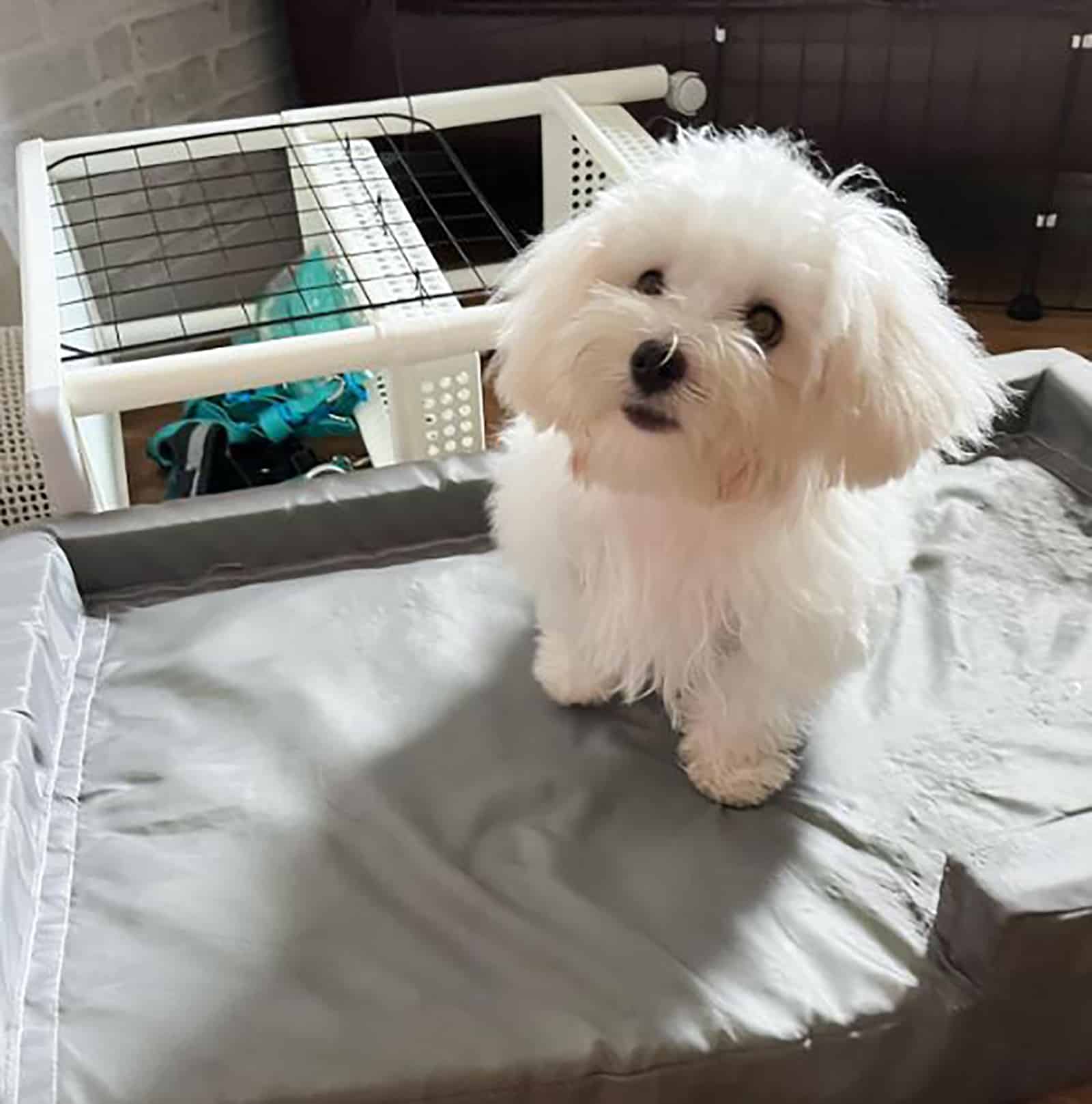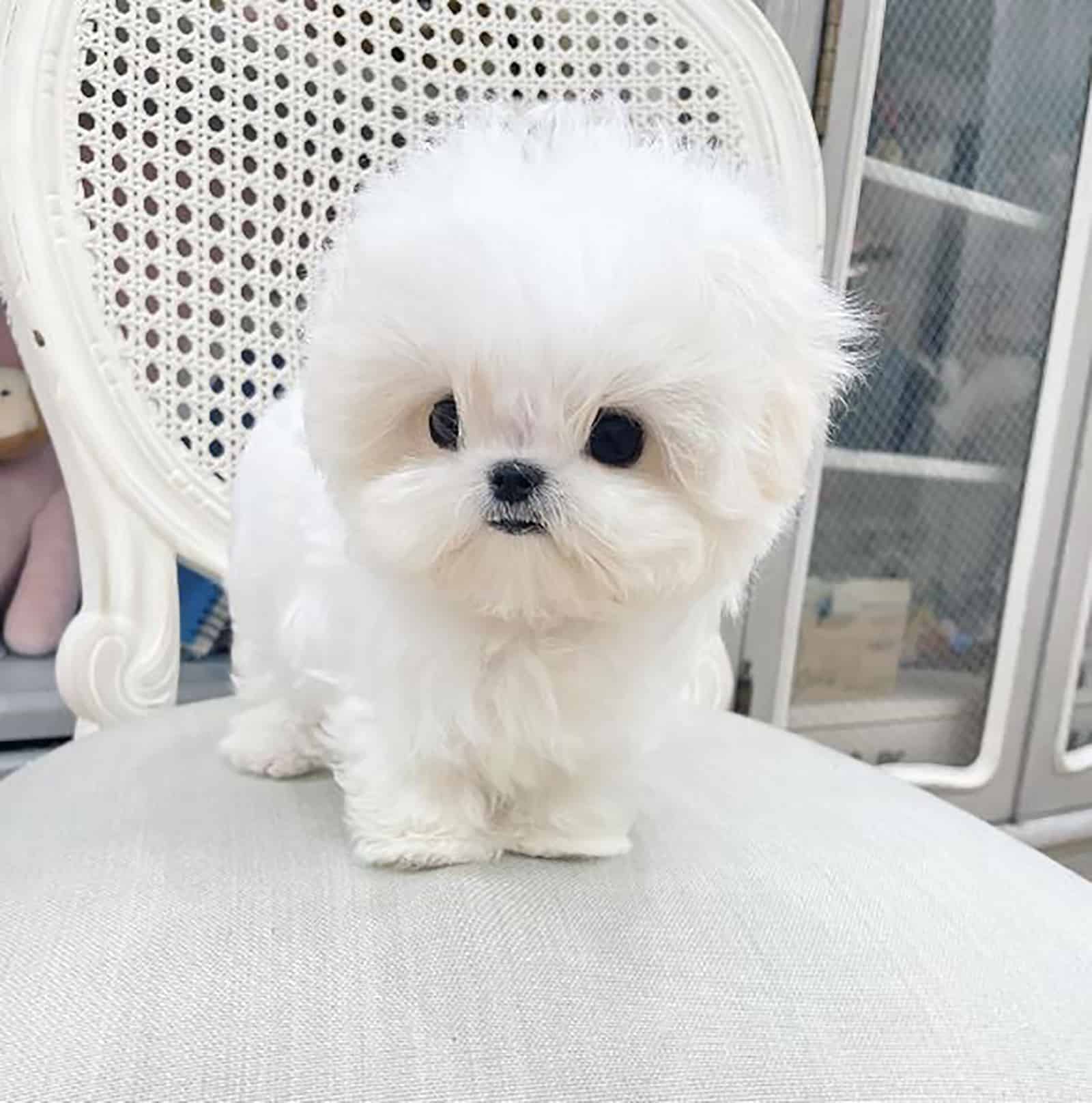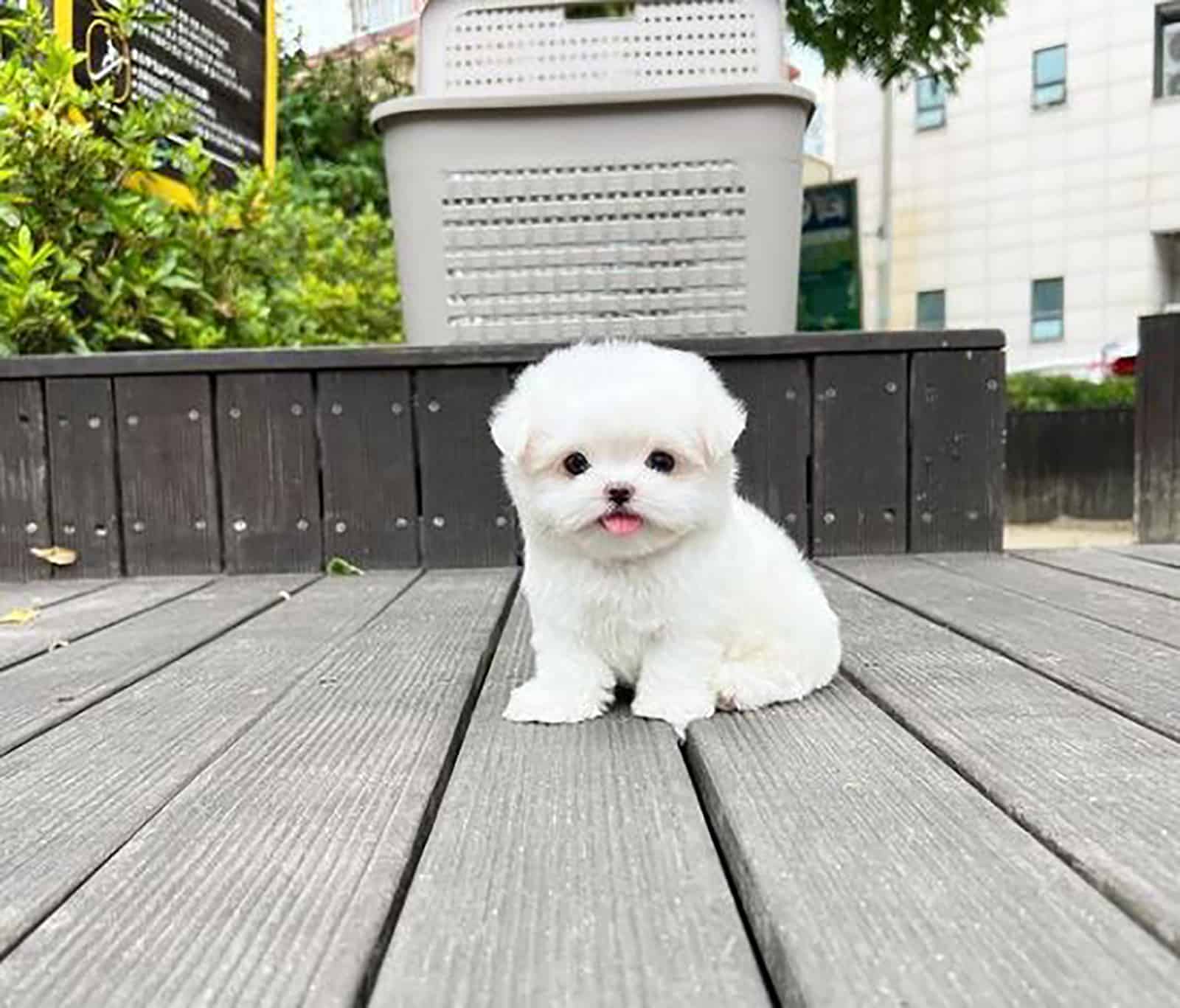What’s that pawdorable little white dog? Is it a Maltese? No, it’s a teacup Maltese – an even cuter version of the standard Maltese! Yup, that’s possible!
Although the teacup version of the Maltese will never be recognized by the American Kennel Club, just like the teacup Pomeranian, or the teacup Chihuahua, or the Shih Tzu, no one forbids us to lose our minds about this incredible little doggy.
A Teacup Maltese is as adorable and friendly as a normal Maltese. People absolutely adore this dog breed. Good thing they’re born to be adored!
If you need all the breed information on a Teacup Maltese, or if you need some help with deciding whether you should get one or not, then keep on reading.
I know you’ll be amazed by how sweet these fluffy balls of fur are!
What Is A Teacup Maltese?
A Teacup Maltese is a Maltese dog like any other, but it’s even tinier than the original Maltese.
Maltese dogs are small dogs to begin with. If you shrink them to a teacup or a toy size, you get a really tiny dog.
The problem isn’t their size… it’s their lineage. You see, unreliable breeders tend to breed litter runts in order to achieve the tiny size of Maltese pups; however, such parents can transfer numerous genetic issues to their offspring.
Also, it’s not unusual to breed dogs with a genetic condition called dwarfism, which affects their size. In such a case, it’s highly likely that the offspring will inherit the small size everyone’s raving about.
Lastly, the teacup size can be achieved by crossbreeding Maltese pups with other toy dogs.
None of these ways is the right way if we look at things from an ethical point of view. Teacup dogs aren’t recognized by the official kennel clubs, and they never will be.
Their Origin: Where Do Teacup Maltese Pups Come From?

Photo from: @mongshushu.co.kr
Throughout history, dogs were given special tasks to help we humans. That’s why we have many shepherd dogs, as well as other working-type canines. Some pooches were used as watch dogs, while others proved they were better as guard dogs.
But, what about our Maltese dog? What kind of a role did they have?
To answer this question, we have to travel back in time.
Maltese dogs are originally from the small island in the Mediterranean, Malta. These dogs belong to a breed that’s several thousand years old. Still, Maltese dogs only served as companion dogs. They did not have any other purpose other than being cuddle buddies.
People back then used to adore Malteses. This situation hasn’t changed up to today. Maltese doggos are still beloved family pets and fluffy companions that everyone loves.
But, it’s not their loveable temperament that made them so popular… it’s also their silky coat.
Recent times have brought on many allergies related to dogs; hence, why hypoallergenic dogs are so popular. Maltese dogs belong in that group.
A Malt’s hypoallergenic traits are definitely one of the reasons why people love the Maltese breed so much.
As far as the origin of the Teacup Maltese goes, it’s hard to tell when the first Teacup Malts appeared.
However, since teacup dogs were quite the trend in the 1990s, it’s highly likely that the first Teacup Malts appeared more than twenty years ago.
Whoa, time flies!
What Does A Teacup Maltese Look Like?

Photo from: @sapviokennelll
When we talk about a dog’s appearance, we must discuss two major matters: the size and the looks.
Dogs of the Maltese breed can easily be recognized in a crowd. Of all the fluffy dog breeds, they’re probably the most recognizable ones. They’re those pawdorable white buddies that give us a warm sensation around our heart.
How about I give you a general idea of how big a Teacup Maltese can get?
Size
Maltese dogs are already one of the smallest dogs. In fact, they belong to the toy dog group categorized by the AKC. So, you can absolutely call them toy Maltese dogs!
According to the Maltese growth chart, our regular or standard Maltese pups usually grow to about 10 inches at the withers. Their weight suits their small height since Malteses don’t weigh more than nine pounds.
As you can see, they’re already tiny in terms of size.
So, how tiny will a Teacup Maltese be? Is it even possible to shrink this dog breed even more?
A Teacup Maltese is only up to six inches tall at the withers. Like many other teacup dogs, i.e., a Teacup Yorkie, he shouldn’t weigh over five pounds.
A Teacup Maltese is only as big as a puppy of some dog breeds. No wonder why people easily mistake them for little Poodles.
However, a knowing eye will tell the difference between the Maltese and the Poodle breed.
Now, let’s talk about their looks, and what makes a Teacup Maltese so adorable!
Good Looks
As I said, Malteses, as well as Teacup Malteses, are pretty easy to spot, thanks to their fluffy white coat. These dogs are blessed with an eye-catching coat. Surprisingly, Maltese pups come in other colors besides white.
However, the AKC only allows their white color to be registered.
This did not stop Maltese breeders and lovers of this breed to breed and raise other lovely Malt colors like cream, black, white and tan, white and lemon, etc. If you are looking for a companion dog, then its coat color won’t be that important to you.
The official club also states that black markings are allowed.
Those of you who seek puppies to be all according to the breed standards should know the following things about Maltese dogs:
For starters, Maltese dogs have only one coat. Their hair is fine and silky, and naturally, it doesn’t shed. Maltese owners can pick between two different hairstyles.
Usually, we’ll see a short-coated Maltese with almost curly hair. It’s the same hairstyle they feature as puppies.
The puppy cut is more popular because it’s easy to take care of, yet still, the floor-length coat option is also possible. If your Malt features a longer hairstyle, its hair should be silky-smooth.
You can tie it up in a little pigtail so it doesn’t bother the dog’s eyes.
As far as the other appearance features are concerned, Malteses have a rounded head, with tiny black eyes, and a black-button nose.
They’re lucky to have a normally-shaped muzzle, without any brachycephalic issues. Malteses have little, triangular-shaped ears that drop down.
All in all… it’s a compact dog, but the teacup version is extra small, and needs extra attention. Still, both sizes look the same.
What Are Teacup Malteses Like Temperament-Wise?

Photo from: @teacupyorkiespuppy222
The Maltese was bred to be a cuddly lap dog. They didn’t really have a working task back in the days, and this has significantly reflected their temperament.
Working dogs like the German Shepherd, the Rottweiler, and the Doberman have strong work ethics, and thus, a somewhat serious temperament.
They can be cuddly, but they still act more like adult dogs. But, don’t get this mixed up with a Rottweiler’s aggression, for example. That’s a whole other thing.
What I’m trying to say is that it seems like having a job has made some dogs less approachable and more serious. On the other hand, Malteses have always been very friendly, bouncy, and happy, no matter if they’re Maltese boys or girls.
These little dogs are the life of the party, and they can make anyone laugh.
People these days will always pick a Maltese over a Rottie, for example, just because some dogs have bad publicity.
But, are Maltese dogs really that sweet? Is their friendliness just a mask, and are they actually feisty little monsters?
A Maltese isn’t even yappy or likes to bark! They’re quiet, calm, and don’t want to do anything that could upset their family members. Our miniature Maltese doesn’t even have the capacity to bark like a big dog!
So, no… don’t doubt their friendliness. A Maltese is super friendly, and seems to be the happiest when he’s around his family. You can say they’re clingy – not as clingy as Doxies, but still. If you leave them alone for too long, you’ll make them sad.
Bring them along when you’re running errands or going out. Just don’t break a tiny Teacup Maltese’s heart!
I have to add that the separation anxiety that the mini Maltese develops can be problematic. Even if you do put them through early socialization, a Maltese will show signs of depression if you’re absent for too long.
Either you bring them along or you hire someone to dog-sit for you. Everyone who’s a dog lover would definitely like to take care of one of the happiest dogs in the world!
What Kind Of Health Problems Do Teacup Malteses Have?

Photo from: @lucas_thegoodboi
Finally, we come to the part of the article which will shine light on the dark side of the Teacup Maltese… health problems. Every dog owner dreads having their dog get ill.
Sadly, a Teacup Maltese is a dog breed with many health problems, and they all exist, thanks to unethical breeding throughout the years.
With an average lifespan of twelve to fifteen years, Teacup Maltese dogs have a bunch of potential health issues.
Let’s see what these tiny creatures are prone to!
Respiratory Problems
Although they’re not brachycephalic dogs, Teacup Maltese have respiratory problems. The issues are a result of their tiny body and an even tinier respiratory system.
If you see your dog struggling to breathe or looking like he has sleep apnea, better contact your vet. Teacup Maltese dogs need extra help.
Dental Problems
Maltese dogs are notorious for having really bad breath. They’re also prone to dental issues like having their teeth go bad to the point of no return.
That’s why it’s highly important to brush your Malt’s teeth daily. If you can’t commit to daily brushing, do it as often as you can.
Another issue regarding their teeth is their tiny size. A Teacup Maltese has a very small jaw, and his teeth can get overcrowded. Better have your vet check out those pearly whites!
Heart Problems
Maltese dogs are highly prone to developing some sort of heart condition. In fact, the biggest cause of death in senior Maltese dogs is heart failure. It usually happens when one of the valves deteriorates.
Since Teacup Maltese dogs have such a small heart, it’s not recommended for them to have strenuous workouts. Light exercises in order to maintain their weight is all they need.
Speaking of weight… don’t allow your Teacup Maltese to become overweight. Not only will it cause issues with the dog’s heart, but it will also result in severe damage to the dog’s bones and affect its mobility.
Hypoglycemia
In other words, this condition is characterized by low blood sugar.
To be honest, this is the most common issue with Teacup Maltese dogs. Luckily, it can be regulated with a proper diet for a Maltese that is prescribed by a professional. Stick to the chosen dog food, and don’t change it without consulting with your vet.
Otherwise, you’re risking health issues for your little Teacup Malt.
Bone Problems
Lastly, we have bone problems. This is a pretty obvious condition for teacup dogs. Bones are fragile. They shouldn’t be put under too much pressure.
If you want your dog to move around and have an easy life, then don’t cause any harm to its bone and joint systems.
Are Teacup Maltese Easy To Take Care Of?

Photo from: @umm__tomorrow__
The Maltese is a hypoallergenic dog. They don’t shed, but they do need some extra grooming. This is only the beginning of the list of how to take care of a Maltese. But, don’t worry – they’re not THAT hard to look after.
In fact, the Maltese is one of the low-maintenance dogs that everyone wants to have!
Still, I’d like to give you a general idea of what it’s like to take care of this dog breed. Let’s get started!
Grooming
Of course, the first thing we need to discuss is grooming a Maltese. It’s a general rule that all hypoallergenic dogs need extra brushing on a weekly basis. Think of it as a price you have to pay in order to have a non-shedding dog at home.
Since the Maltese has only one coat, without an undercoat, you don’t need lots of grooming tools. Some high-quality slicker and other brushes designed for Malteses should help you out.
The important thing is to brush your Maltese three to four times a week (at least) to prevent matting of the coat.
There’s nothing sadder than a poorly-groomed Maltese.
Maltese dogs are known for having tear stains. They do stain their white coat, but it’s not something that’s supposed to make them uglier. In fact, they seem even cuter.
You’ll need to wipe off those stains regularly by using a pH-neutral stain remover. Dog shops always have them in stock.
Oh, and do you remember how I told you that Malts have two hairstyles? Well, pick one and keep it nice and tidy.
If grooming is too much for you, then either take your dog to see a professional groomer or pick the “Puppy Cut”.
One last thing about grooming… don’t forget to clean your dog’s ears because they’re floppy, and they can be fertile ground for bacteria to develop. You shouldn’t risk an ear infection with your Maltese.
Exercise Requirements
No teacup dog needs a lot of exercise. It’s impossible for them to work out hard due to their tiny size and fragile bones. That’s one of the reasons why dog experts don’t recommend a Teacup Maltese to a family with young children.
Rough play is absolutely no option, and you must be extra careful around the micro Teacup Maltese not to exhaust them.
These pups only need a short walk a day and some light play to keep their energy levels drained. You can tell they’re perfect for people who don’t have much free time on their hands.
A light exercise regime will be enough for them to lose calories and maintain a healthy weight… well, if five pounds is considered healthy to begin with.
Also, I must warn you that toy breeds usually don’t do well with stairs or elevated surfaces. Don’t let them go up and down stairs.
This is to prevent health issues related to their mobility. Trust me… they’re already very prone to dysplasia and similar conditions, so you don’t need to introduce stairs.
Training 101
The Teacup Maltese isn’t the world’s smartest pooch, but they’re not idiotic either. All dogs are intelligent, but it only depends on which area the intelligence is needed.
For example, Spaniels are hard-working and smart, which is perfect for fetching wildfowl. A Maltese is intelligent enough to listen to its owner.
Luckily, you shouldn’t have any major problems with training a Teacup Maltese. They may not like to learn fun tricks as Bichons do, but they will master basic obedience courses.
Potty training could be an issue, especially because of their tiny bladder, but all dogs can experience issues with this training.
What you need to remember is to avoid using any punishment if they fail to perform a task. A Maltese is definitely a sensitive dog, and he’ll never forgive you for hitting him. So, it is a huge no for yelling at your dog!
Instead, use positive reinforcement. All dogs like to be rewarded after performing a task well. Your Maltese might like getting belly rubs or scratched behind its ears.
Or, he might like getting some treats. Just remember not to push the daily dog food limit in order to prevent obesity.
The Maltese can be the perfectly-obedient family dog if you work with it and show commitment.
How Much Is A Teacup Maltese?

Photo from: @velydog__ddm
There are numerous factors that affect the price of a Teacup Maltese puppy. Let’s just say they’re not the cheapest pups on the market, but they’re not crazy expensive either.
The cost of a standard Maltese isn’t different from the cost of a Teacup Maltese. These dogs range from around $800 up to $2,000. It depends where you get your Maltese puppy from.
When I said there are factors that affect the price of the Teacup Maltese, I meant the availability and the choice of reputable breeders.
Teacup Maltese females can only give birth to one or two puppies. They’re tiny dogs to begin with, and they produce even tinier puppies in their litter. Naturally, the litter will be sold very fast. The other problem is a lack of reputable breeders.
If you take into consideration the fact that Teacup Maltese dogs are being bred unethically, then the lack of good breeders is absolutely justified.
Be extra careful who you trust when buying a Teacup Maltese. There are a lot of scammers out there. If you see a sign saying “Maltese puppies for sale” for quite a ridiculously low price, i.e., too low or even too high, you should be worried.
More on spotting the right breeder down below.
Where Do You Find Good Teacup Maltese Breeders?

Photo from: @tiny_paws_puppy_boutique
The Maltese dog breed is highly popular, but it’s not as in demand in the States as other breeds are. When it comes to Maltese breeders, we do have some reliable sources we’ll mention later.
The first thing you have to do when you find a Teacup Maltese breeder is to check out the conditions under which he keeps his dogs. Unreliable breeders and scammers don’t really care about where they keep their dogs.
It’s usually a dirty kennel with tiny cages, without any fresh air or sunlight. Or, it’s a dirty back yard without normal living conditions.
This should raise the first red flag.
The second red flag would be the lack of medical examinations or health tests that prove whether a dog is healthy or not.
Reliable dog breeders always submit their dogs to tests for hereditary conditions such as hip dysplasia, cataracts, genetic malfunctions, etc.
Finally, the third red flag that should tell you to get out of there is the price. A clear sign that something’s wrong with a dog would be a very low price.
Dogs that aren’t in their best shape, and have lots of health problems, usually go for as low as a couple of hundred dollars.
Of course, that’s not the price of a Teacup Maltese. As you can see, their price usually ranges between $800 and $2,000.
Teacup Maltese pups shouldn’t be priced at only $300 or $400 like some breeders list them. Those breeders only care about fast money.
Now, since breeding teacups is quite controversial, I must warn you that you’ll have some issues finding the right breeder. PupVine can recommend you these Teacup Maltese breeders.
If you can’t seem to find your pawfect puppy, maybe some of the Maltese breeders listed down below could help you out:
Your last source can be rescue organizations focused on Maltese dogs. Who knows… maybe they’ll have your tiny Maltese!
Maltese Mixes: Why Do People Love Them?

Photo from: @teacupmaltsespuppieshome1
Back in the day, crossbreeding wasn’t usually done on purpose. Hybrid dogs existed because they were accidentally bred. Rarely was any breeder focused on mixing purebred dogs to get new dog lines.
Up until the turn of the century, mixed breed dogs, hybrids, or designer dogs, weren’t that popular. Then, the situation changed drastically.
Many designer dogs appeared on the scene, including many Goldendoodle generations (F1 Goldendoodle, F2 Goldendoodle, F3 Goldendoodle…).
However, small dog mixes also became highly in demand.
The common denominator for all new designer dogs was their hypoallergenic coat. Dog allergies began striking more and more people, and how can a dog lover enjoy dogs if he has allergies? It’s simple: get a hypoallergenic dog!
Now, we all know that hypoallergenic dogs aren’t real. It’s just an easier way for us to tell that some dogs don’t cause allergies as much as others do.
Enter the scene: Maltese dogs!
The Maltese is a pup blessed with a low-shedding coat that doesn’t trigger allergic reactions. As such, breeders thought it was good to breed them with other low-shedding dogs to get even less-shedding puppies.
Maltese mixes became quite popular because they were a guarantee that puppies would be suitable for allergic people.
Of course, there were situations in which a Maltese was bred with a non-hypoallergenic dog, for example, the Maltese Chihuahua mix.
The resulting puppy had hypoallergenic traits inherited from the Malt parent, and it soon became the popular Malchi.
Maltese mixes are also popular for their loveable temperament. These are cuddle dogs, loyal friends, and most importantly, kind souls that don’t mean harm in any case.
If you need a small dog that will be your companion for life, you should either pick a Maltese or a Maltese mix.
To Sum Up…
The cutest little white teddy bear (the Teacup Maltese) is surely a pup to adore. Well, the original Maltese was purposely bred to be adored, so why shouldn’t the Teacup Maltese have the same treatment?
We can all agree that there’s hardly a cuter pup out there.
But, all this beauty comes with a price. Teacup Maltese dogs aren’t as healthy as they may seem. Sadly, these doggies bring lots of risks, and they’re not suitable for everyone to own.
I’d recommend a Teacup Maltese only to adults who know how to take care of it… of course, only if the puppy is completely free of hereditary conditions. And, to achieve that, the breeder will need to struggle a lot.
Be careful where you get your Teacup Maltese puppies. As you can see from this article, scammers are everywhere. It’s good to know how to recognize, and thus, avoid them.
Give your trust only to people who are seriously devoted to breeding the finest specimen of Teacup Maltese dogs!
